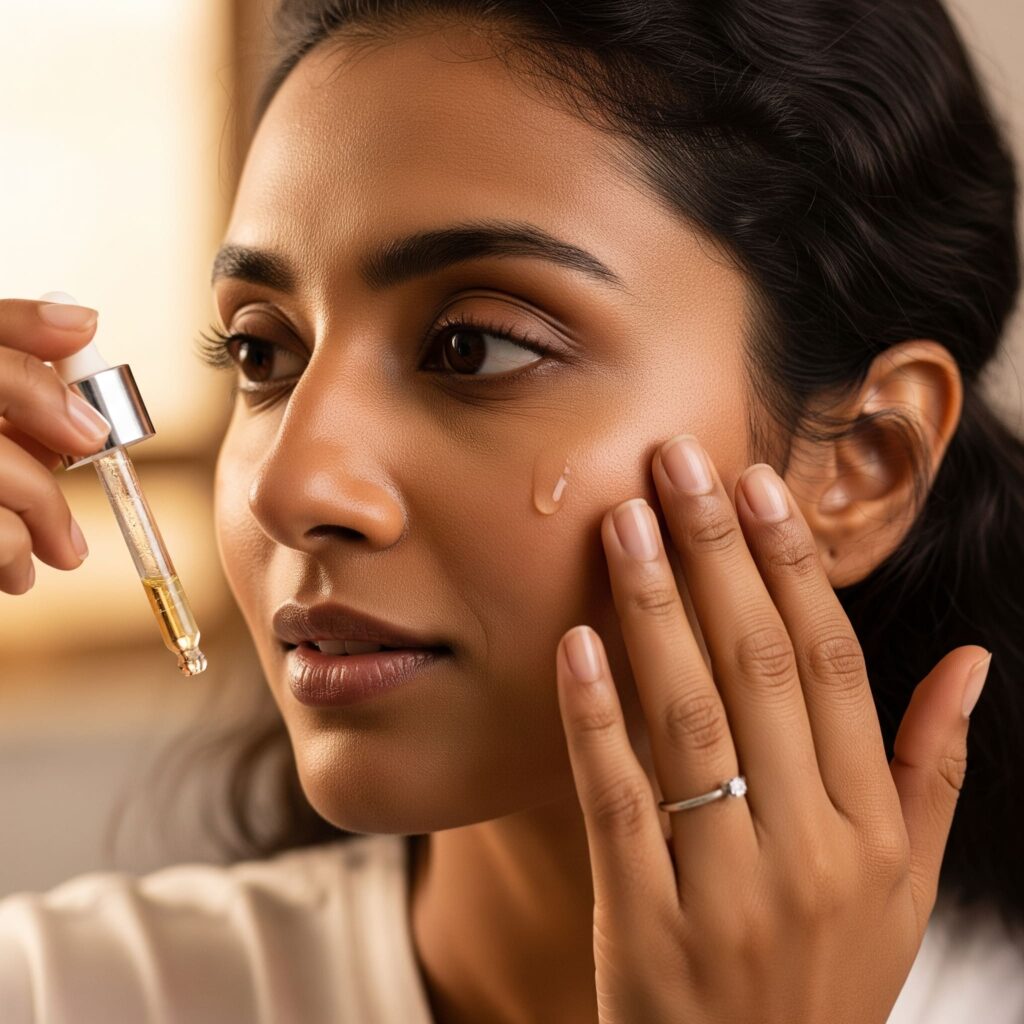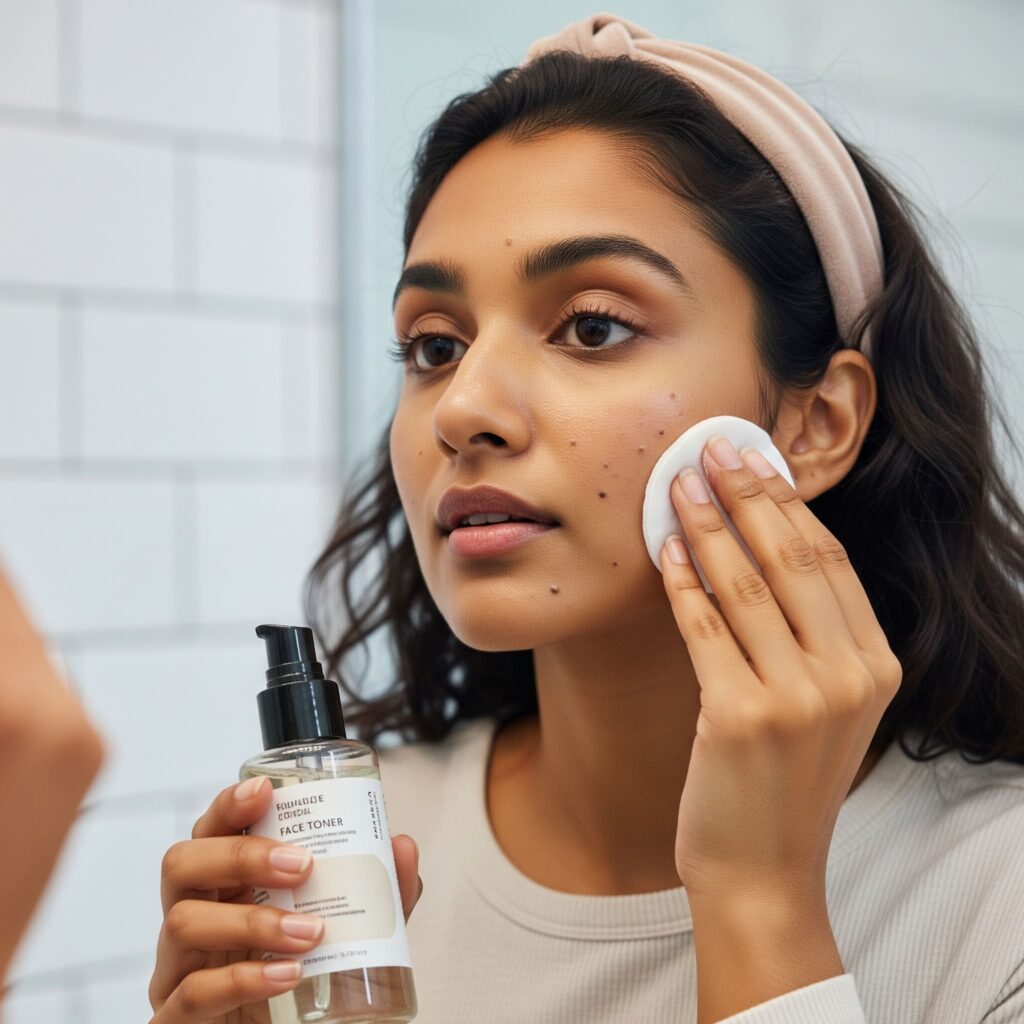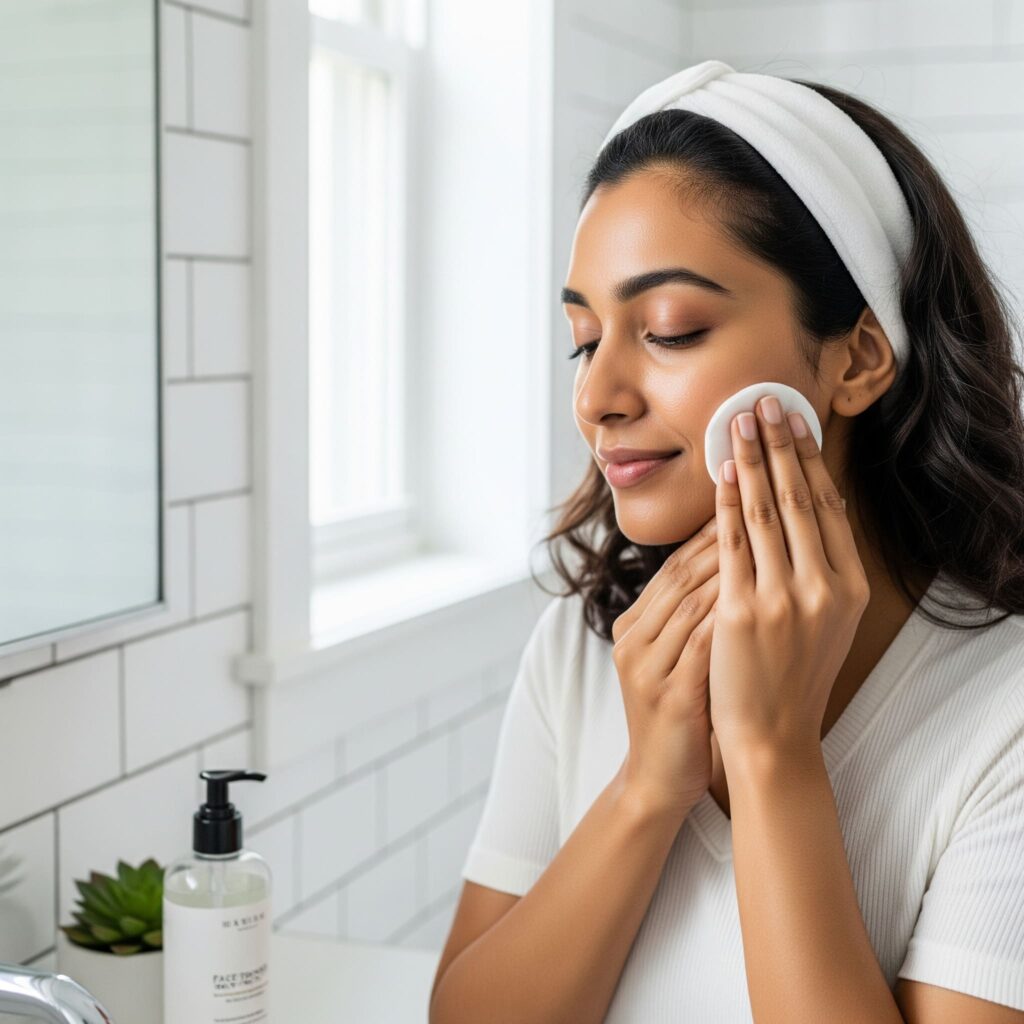Toners are lighter, water-based liquids that balance skin pH and prep the skin for other products, while serums are thicker, concentrated treatments with potent active ingredients designed to address specific skin concerns like wrinkles or dark spots. Toners usually come in larger bottles for skin balancing, whereas serums, containing higher concentrations of ingredients, are sold in smaller vials for targeted treatment.
Serum vs toner are both essential in skincare, but they serve different purposes. Serum vs toner helps you understand that toners balance your skin’s pH and prepare it for further treatments, while serums deliver concentrated active ingredients to tackle specific skin issues. Knowing serum vs toner helps you choose the right product for concerns like acne, dryness, or dullness, and use them effectively to enhance your skincare routine.
Table of Contents
What Is a Serum?
A serum is a concentrated skincare product formulated with small molecules and active ingredients designed to penetrate deeply into the skin. When considering serum vs toner, serums deliver high doses of vitamins, antioxidants, peptides, or acids directly to address targeted concerns like acne, pigmentation, dryness, or aging. Unlike toners, which primarily prepare and balance the skin’s pH, serums are typically lightweight, fast-absorbing liquids or gels ideal for layering under moisturizers or sunscreens for maximum effectiveness. In the serum vs toner debate, serums are favored for their ability to treat specific skin issues with concentrated ingredients while toners serve more as preparatory or balancing products in your skincare routine.

Benefits of Using Serum on Your Face
The benefits of using serum on your face are numerous, especially when comparing serum vs toner. Unlike toners that primarily balance and prep the skin, serums deliver concentrated active ingredients deep into the skin for targeted results. Understanding serum vs toner helps you incorporate both effectively to achieve radiant, hydrated, and even-toned skin.
- Targets specific skin concerns such as acne, wrinkles, dark spots, or dullness.
- Deep penetration ensures active ingredients reach lower skin layers for maximum effect.
- Light texture avoids clogging pores, suitable for oily and acne-prone skin.
- Boosts hydration and skin repair depending on formulation.
- Improves overall texture and tone faster than many other products.
- Enhances skin radiance and suppleness with consistent use.

Explore key differences between waxing and shaving for smooth, lasting results.
What Is a Face Toner?
Face toner is a liquid product applied after cleansing to remove leftover impurities, restore skin’s pH balance, and prepare the skin for subsequent treatments. When comparing serum vs toner, toners refresh and hydrate the skin while tightening pores and soothing irritation. The debate between serum vs toner often comes down to their functions: toners balance and prep the skin, whereas serums deliver concentrated treatments. Toners often contain ingredients like witch hazel, glycolic acid, hyaluronic acid, or rose water, catering to different skin types. Understanding serum vs toner can help you choose the best product for your skincare routine.

Benefits of Adding Toner to Your Skincare Routine
Adding toner to your skincare routine offers multiple benefits; serum vs toner, both play unique roles in enhancing skin health. Serum vs toner, toners help balance skin’s pH and prep the skin for better absorption of serums and other products. Understanding serum vs toner usage ensures you get the best results, with toners refreshing and serums delivering concentrated treatment.
- Balances skin pH disrupted by cleansing
- Removes residual dirt and makeup traces missed by cleansers
- Hydrates and refreshes skin, preventing dryness or tightness
- Minimizes enlarged pores and smooths skin texture
- Calms inflammation and reduces acne or sensitivity with specific formulas
- Offers a base for better absorption of serums and moisturizers
- An essential step for clean, healthy skin

Discover the key differences between pedicure and manicure for perfect nails.
Difference Between Serum vs Toner
The serum vs toner debate often confuses skincare beginners. Understanding the serum vs toner difference helps in choosing the right product for your skin type. Proper use of serum vs toner can enhance your skincare routine and deliver better results.
| Feature | Serum | Toner |
| Purpose | Targets specific concerns with potent actives | Balances pH, removes residue, hydrates skin |
| Texture | Lightweight, concentrated liquid or gel | Thin, watery or lightly viscous liquid |
| Function | Penetrates deeply for repair and enhancement | Surface-level cleansing and pH balance |
| Usage | Applied after toner, before moisturizer | Applied after cleansing, before serum |
| Skin Benefits | Corrects acne, pigmentation, aging, hydration | Clears residual dirt, calms, preps skin |
| Formulation Complexity | High concentration of actives | Mild, gentle formulations |
Compare waxing and laser hair removal to find the best option for smooth skin.
Do I Need a Serum or Toner in my Skincare Routine?
Choosing between serum vs toner can be confusing when building your skincare routine. Both play important but different roles: serum provides concentrated active ingredients to target specific skin concerns, while toner helps balance your skin’s pH and prepare it for further treatment. Understanding serum vs toner helps you decide which product suits your skin’s needs best.
When it comes to serum vs toner, it’s important to know they complement each other rather than replace one another. Many skincare routines use both-toner right after cleansing, and serum afterward-to maximize benefits. So, whether you need hydration, anti-aging effects, or oil control, knowing serum vs toner will guide you to a healthier, balanced complexion. Discover how regular hair trims promote healthier, thicker, and manageable hair.
Why Should You Add Face Serum To Your Skin Care?
Adding a face serum to your skin care routine can make a significant difference in your skin’s health and appearance. Unlike toners, serums are packed with concentrated active ingredients that penetrate deeply to target specific concerns like dryness, wrinkles, and dark spots. When considering serum vs toner, it is important to understand that while toners balance and prep the skin, serums deliver intensive nourishment and repair.
The debate of serum vs toner often confuses many, but both play unique roles. Using a face serum after toner ensures your skin absorbs powerful ingredients more effectively. By incorporating both serum and toner into your routine, you achieve balanced, hydrated, and radiant skin, elevating your overall skin care regimen. Discover the key differences between face cleanser and face wash here.
How Long Should You Wait to Apply Serum After Toner?
When it comes to skincare, understanding the difference between serum vs toner is crucial for an effective routine. You should typically wait for your toner to fully absorb into your skin before applying serum. This waiting time ensures the serum can penetrate deeply without interference. In the serum vs toner debate, toner preps and balances your skin, while serum targets specific concerns with concentrated ingredients.
Applying serum too soon after toner can dilute the benefits, so allowing a minute or two helps maximize effectiveness. Remember, in the serum vs toner layering, toner is lighter and applied first, followed by the serum’s nourishing formula. Proper timing and order make all the difference in achieving radiant, healthy skin. Discover the key differences between hair cleansers and shampoos easily.
Conclusion
Understanding the difference between serum vs toner allows you to build a targeted skincare routine that maximizes each product’s benefits. In the serum vs toner debate, toners primarily balance and refresh your skin post-cleansing, while serums deliver potent ingredients deeply to address concerns like acne or aging. Choosing the right products and knowing when to use serum vs toner ensures healthier, radiant skin over time. Combining both toners and serums harmoniously enhances your skincare results beyond cleansing alone.
For personalized Glow Skin advice and expert tips tailored to all skin types, visit Peacock Salon in Vashi, Navi Mumbai. Our skilled estheticians specialize in healthy, radiant, and results-driven Glow Skin treatments suitable for every skin type. Find us at Mahavir Center, Shop No. 20, 21, 21A, 22, next to Golden Punjab Hotel, Sector 17, Vashi or call +91 9324774567 to book your consultation and illuminate your skincare routine.
Serum vs Toner – FAQs
What is the difference between serum and toner?
Serum delivers concentrated active ingredients deep into the skin, while toner balances pH, removes residual dirt, and hydrates at the skin surface.
Which is better, serum or toner?
Both serve distinct purposes; toner preps and cleanses the skin after washing, serum treats specific concerns and boosts skin health.
What are the benefits of using toner for your face?
Toners balance skin pH, tighten pores, hydrate, remove leftover impurities, and prepare skin for better absorption of skincare products.
What are the benefits of using serum?
Serums provide targeted treatment for acne, aging, pigmentation, hydration, and improve skin texture via deep skin penetration.
Can toner help with acne?
Yes, toners containing astringents or exfoliants help reduce excess oil, clean pores, and soothe acne-prone skin.
What face serum is good for acne?
Serums with salicylic acid, niacinamide, or tea tree oil help reduce breakouts and control inflammation.
How do I layer toner and serum?
After cleansing, apply toner and wait for it to absorb; then apply serum for optimal penetration, followed by moisturizer.
Can toner be used for glowing skin?
Hydrating toners enhance skin glow by adding moisture and smoothing skin texture.
How often should I use serum and toner?
Toner can be used twice daily after cleansing, serum usage depends on product and skin needs, often once or twice daily.
Can I skip toner and just use serum?
While serums are vital for treatment, toners help thoroughly cleanse and prep skin, enhancing serum effectiveness and skin health.
